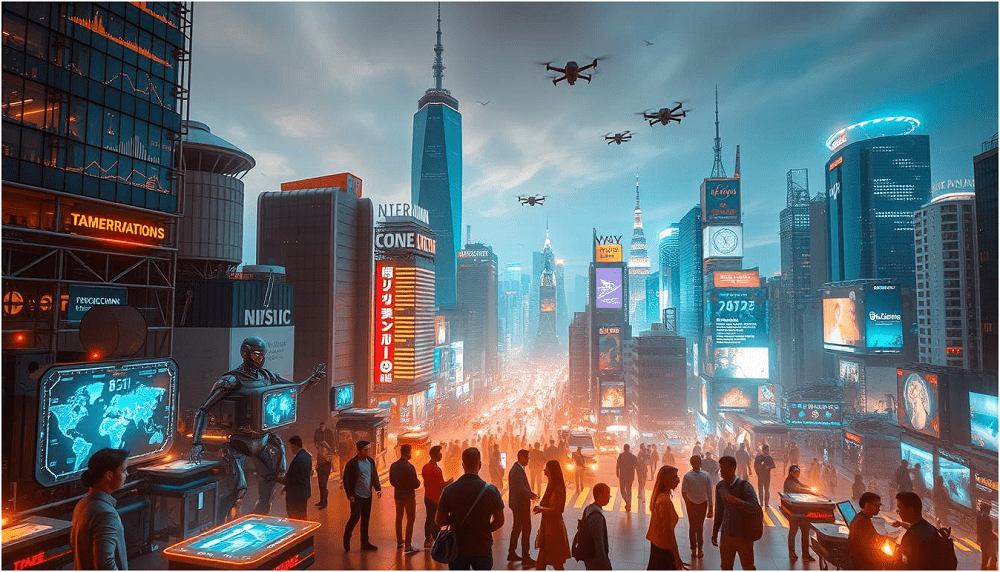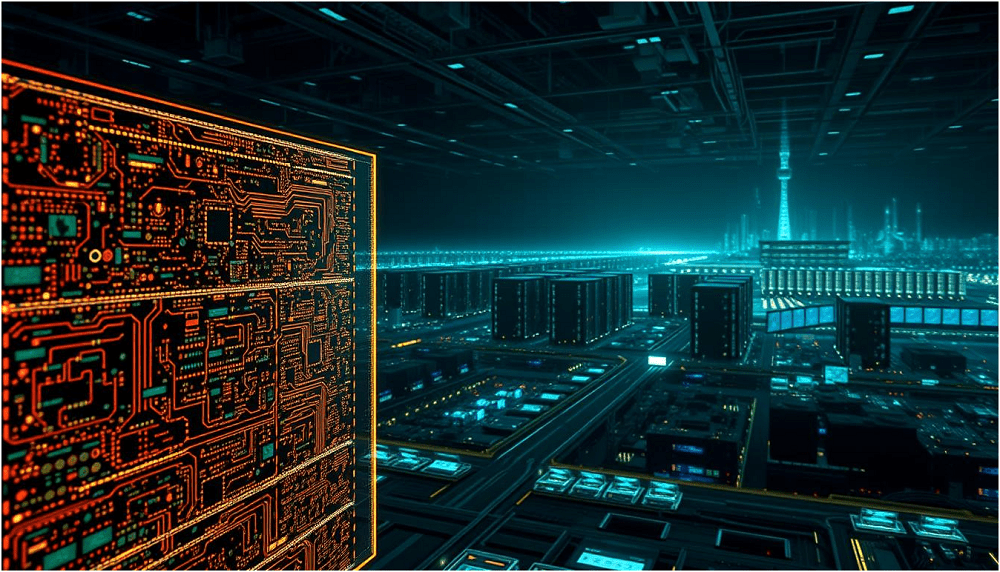The technology landscape is evolving rapidly, driven by innovations transforming how we live and work. The latest advancements are enhancing existing technologies and paving the way for new ones.
As we navigate the current tech landscape, several key areas emerge at the forefront of this transformation. These include the awe-inspiring advancements in artificial intelligence, the game-changing proliferation of 5G networks, and the ever-growing importance of cybersecurity.

Understanding these developments is not just a matter of interest, but a crucial step for businesses and individuals alike. These trends are not just shaping the future, but they are the key to unlocking future opportunities and mitigating potential risks.
Key Takeaways
- Emerging technologies are reshaping the tech industry.
- Artificial intelligence is becoming increasingly integral to business operations.
- The rollout of 5G networks is set to revolutionize connectivity.
- Cybersecurity is gaining prominence as a critical concern.
- Staying abreast of these trends is vital for future success.
The Current State of Technology Innovation
Rapid advancements and transformative trends characterize the current state of technological innovation. The pandemic, in particular, has acted as a catalyst, accelerating technology adoption across various sectors.
How Technology Adoption Has Accelerated Post-Pandemic
The pandemic has driven businesses to adopt digital technologies at an unprecedented rate. This acceleration is evident in two key areas:
- Digital Transformation Acceleration: Companies are rapidly integrating digital solutions to enhance operational efficiency and customer engagement.
- Remote Work Technology Evolution: The shift to remote work has spurred innovations in collaboration tools, virtual communication platforms, and cybersecurity measures.
The Convergence of Multiple Technologies
The convergence of various technologies is creating new opportunities and transforming industries. A key aspect of this convergence is:
Cross-Industry Technology Integration
Technologies such as AI, IoT, and blockchain are being integrated across different industries, leading to innovative applications and business models. For instance, AI-powered IoT devices are enhancing manufacturing processes and customer experiences.
This integration is fostering a more interconnected and efficient technological ecosystem, driving growth and competitiveness.
Artificial Intelligence and Machine Learning Revolution
The tech industry is witnessing a seismic shift with the advent of artificial intelligence and machine learning. These disruptive technologies are not only enhancing existing processes but also creating new avenues for innovation and growth.
Generative AI and Its Business Applications
Generative AI, a subset of AI, is revolutionizing industries by enabling machines to generate content, designs, and solutions that were previously thought to be the exclusive domain of humans.
Content Creation and Design Tools
Generative AI is being used to create sophisticated content creation and design tools. For instance, AI-powered graphic design tools can now produce high-quality visuals without human intervention.
Business Process Automation
AI is also being utilized for business process automation, streamlining operations, and improving efficiency. From customer service chatbots to automated financial reporting, AI is transforming the way businesses operate.
|
Industry |
AI Application |
Benefit |
|
Marketing |
Content Generation |
Increased Efficiency |
|
Finance |
Automated Reporting |
Reduced Errors |
|
Design |
Graphic Design |
Enhanced Creativity |
AI Ethics and Responsible Development
As AI becomes more pervasive, the importance of AI ethics and responsible development cannot be overstated. Ensuring that AI systems are transparent, fair, and unbiased is crucial for their acceptance and success.
Machine Learning Operations (MLOps)
MLOps is critical for deploying ML models effectively. It involves a set of practices that streamline the process of taking an ML model from development to deployment.
The integration of AI and ML into various sectors is marking a new era in technological innovation. As these technologies evolve, their potential to revolutionize industries worldwide is not just promising, but inspiring.
Cloud Computing Evolution
The evolution of cloud computing is marked by several key trends that are transforming how businesses operate and innovate.
As organizations continue to adopt cloud technologies, new strategies and innovations are emerging to enhance efficiency and scalability.
Multi-Cloud and Hybrid Cloud Strategies
Multi-cloud and hybrid cloud strategies are becoming increasingly popular as businesses seek to optimize their cloud infrastructure.
- Improved flexibility and scalability
- Better cost management
- Enhanced disaster recovery capabilities
Serverless Computing
Serverless computing is another significant trend, allowing developers to build and deploy applications without managing servers.
Edge Computing Integration
Edge computing integration is also gaining traction, enabling real-time processing and reduced latency.
Real-Time Processing Applications
Real-time processing applications are critical in industries such as finance, healthcare, and IoT industries.
Reduced Latency Benefits
Reduced latency benefits include improved user experience and faster data analysis.
Innovation and efficiency across various sectors, aligning with popular tech trends and cutting-edge tech trends.
The Biggest Trends in Tech Reshaping Industries
Emerging technologies are revolutionizing traditional industries in unprecedented ways. The most significant trends in tech are transforming businesses, making them more efficient, competitive, and innovative. This transformation is evident across various sectors, including manufacturing, financial services, healthcare, and retail.
This Gartner video show the Top Tech Trends 2025:
Digital Transformation Across Traditional Sectors
Digital transformation is a key trend reshaping traditional industries. Companies are adopting digital technologies to enhance their operations, improve customer experiences, and gain a competitive edge.
Manufacturing and Industry 4.0
The manufacturing sector is undergoing a significant transformation with the adoption of Industry 4.0 technologies. This includes the use of IoT devices, AI, and robotics to create smart factories that are more efficient and productive.
Financial Services Innovation
The financial services sector is also experiencing a digital revolution. Technologies like blockchain, AI, and mobile payments are changing the way financial services are delivered, making them more accessible and convenient.
Healthcare Technology Advancements
Healthcare is another industry that is being transformed by technology. Advances in telemedicine, AI diagnostics, and personalized medicine are improving patient outcomes and making healthcare more accessible.
Retail and E-commerce Evolution
The retail industry is evolving with the rise of e-commerce and digital technologies. Retailers are adopting omnichannel strategies, using AI for personalized marketing, and enhancing customer experiences through immersive technologies.
The future of technology holds much promise for industries looking to innovate and stay ahead of the curve. By embracing the latest technology trends, businesses can position themselves for success in a rapidly
Internet of Things (IoT) Expansion
As one of the top tech trends, IoT expansion is driving innovation across multiple industries. The Internet of Things is emerging as a significant technological advancement, transforming the way businesses operate, cities are managed, and consumers interact with technology.
The IoT expansion is multifaceted, with various applications across different sectors. One of the key areas where IoT is making a significant impact is in the development of smart cities and infrastructure.
Smart Cities and Infrastructure
IoT technologies are being used to create more efficient, sustainable, and livable urban environments. This includes smart lighting, traffic management systems, and waste management solutions.
Industrial IoT Applications
In line with current tech trends, industrial IoT applications are revolutionizing manufacturing processes. This includes predictive maintenance and supply chain optimization.
Predictive Maintenance
Predictive maintenance allows companies to anticipate equipment failures, reducing downtime and increasing overall efficiency.
Supply Chain Optimization
IoT devices provide real-time data on inventory levels, shipment tracking, and logistics, enabling businesses to optimize their supply chains.
Consumer IoT Innovations
Consumer IoT innovations are changing the way people live and interact with technology. This includes smart home devices, wearables, and health monitoring systems.
|
IoT Application |
Industry |
Benefits |
|
Predictive Maintenance |
Manufacturing |
Reduced downtime, increased efficiency |
|
Smart Lighting |
Urban Infrastructure |
Energy savings, improved safety |
|
Smart Home Devices |
Consumer Electronics |
Enhanced convenience, improved home security |
Cybersecurity in the Digital Age
In the era of rapid technological innovation, cybersecurity has emerged as a crucial factor in protecting digital assets. As organizations adopt disruptive technologies and leverage the latest tech innovations, they must also contend with increasingly sophisticated cyber threats.
Zero Trust Architecture
One of the key technology trends in cybersecurity is the adoption of Zero Trust Architecture (ZTA). ZTA operates on the principle that no user or device should be trusted by default, regardless of whether they are inside or outside the network.
AI-Powered Security Solutions
Another significant development is the use of AI-Powered Security Solutions. These solutions leverage machine learning algorithms to detect and respond to cyber threats in real-time, enhancing the overall security posture of an organization.
Privacy-Enhancing Technologies
Privacy-Enhancing Technologies are also gaining traction as organizations seek to protect sensitive data. These technologies include:
- Encryption methods to secure data both in transit and at rest
- Anonymization techniques to protect user identities
Data Protection Strategies
Effective data protection strategies are critical in maintaining cybersecurity. This includes implementing robust access controls, conducting regular security audits, and ensuring compliance with relevant data protection regulations.
Regulatory Compliance Tools
Regulatory compliance tools help organizations navigate the complex landscape of cybersecurity regulations. These tools enable businesses to stay compliant with standards such as GDPR and HIPAA, thereby avoiding potential legal and financial repercussions.

By adopting these cybersecurity measures, organizations can better protect themselves against the evolving threat landscape and maintain the trust of their customers and stakeholders.
Blockchain and Decentralized Technologies
As blockchain and decentralized technologies mature, their applications are expanding exponentially. This growth is not limited to cryptocurrency; instead, it’s transforming various industries by offering secure, transparent, and efficient solutions.
Beyond Cryptocurrency: Enterprise Blockchain+
Enterprise blockchain solutions are being adopted across industries for their ability to enhance supply chain management, facilitate secure transactions, and ensure data integrity. Companies are leveraging blockchain to streamline operations and improve trust among stakeholders.
Decentralized Finance (DeFi)
DeFi is revolutionizing the financial sector by providing decentralized lending, borrowing, and trading services. This emerging trend is democratizing access to financial instruments and challenging traditional banking systems.
Web3 Development
Web3 represents the next generation of the internet, where users have more control over their data. It encompasses decentralized applications (dApps) and non-fungible tokens (NFTs), among other innovations.
Decentralized Applications (dApps)
dApps operate on blockchain networks, offering greater security and transparency compared to traditional applications. They have the potential to disrupt various sectors, from finance to entertainment.
Non-Fungible Tokens (NFTs)
NFTs are unique digital assets that are being used to represent art, collectibles, and even real-world assets. They are creating new markets and opportunities for creators and collectors alike.
|
Technology |
Application |
Industry Impact |
|
Enterprise Blockchain |
Supply Chain Management |
Enhanced transparency and efficiency |
|
DeFi |
Decentralized Lending |
Democratization of financial services |
|
dApps |
Decentralized Social Media |
Increased user control over data |
5G and Advanced Connectivity
The advent of 5G is not just an incremental upgrade; it’s a revolutionary leap in connectivity and speed. As one of the top tech trends, 5G is poised to significantly impact various aspects of the tech industry.
Impact on Business Operations
5G’s faster data transfer rates and lower latency are set to transform business operations, enabling more efficient remote work, enhancing supply chain management, and improving overall productivity.
New Applications Enabled by 5G
The capabilities of 5G are opening doors to new applications across different sectors.
Autonomous Vehicles
One of the most promising areas is autonomous vehicles, where 5G’s low latency is crucial for real-time data processing and decision-making.
Immersive Remote Experiences
5G also enables immersive remote experiences, revolutionizing remote collaboration, entertainment, and education.

The Road to 6G
As 5G continues to roll out, researchers are already looking ahead to the future of technology with 6G, promising even faster speeds and new possibilities for innovation.
Sustainable Technology and Green Tech
Sustainable technology is no longer a niche concept but a mainstream necessity in the tech industry. As concern for the environment continues to grow, companies are increasingly adopting green tech solutions to reduce their ecological footprint.
Energy-Efficient Computing
One of the key areas where sustainable technology is making a significant impact is in energy-efficient computing. Innovations in hardware and software are enabling data centers and computing systems to consume less power while maintaining or even improving performance.
Renewable Energy Tech Innovations
Renewable energy technologies are also playing a crucial role in the transition to sustainable tech. Advances in solar, wind, and other renewable energy sources are powering data centers, tech facilities, and other infrastructure, reducing reliance on fossil fuels.
Carbon Footprint Reduction Solutions
Reducing carbon footprint is a critical aspect of green tech. This involves not just energy-efficient operations but also sustainable manufacturing practices, waste reduction, and recycling programs.
Sustainable Data Centers
Sustainable data centers are being designed with energy efficiency in mind, incorporating advanced cooling systems, renewable energy sources, and optimized server utilization.
Circular Economy Technologies
Circular economy technologies aim to reduce waste and promote the reuse and recycling of materials. In the tech industry, this means designing products and services that are restorative and regenerative by design.
By embracing sustainable technology and green tech, the tech industry can significantly reduce its environmental impact while driving innovation and growth. We expect to see even more creative solutions emerge as these trends evolve.
Conclusion: Navigating the Future Tech Landscape
The tech industry is undergoing a significant transformation, driven by the biggest trends in tech, including artificial intelligence, cloud computing, and the Internet of Things (IoT). As technology trends evolve, businesses and individuals must stay ahead of the curve to remain competitive.
The future of technology holds much promise, with advancements in 5G, blockchain, and sustainable tech set to revolutionize various sectors. To navigate this landscape, it’s essential to understand the technology trends shaping the industry and their potential applications.
By embracing these trends and leveraging the latest technologies, organizations can drive innovation, improve efficiency, and create new opportunities. As the tech industry continues to evolve, staying informed about the most significant trends in tech will be crucial for success.
FAQ
Q1: What are the biggest trends transforming the tech industry?
The biggest trends transforming the tech industry include artificial intelligence, cloud computing, Internet of Things (IoT), 5G, blockchain, and sustainable technology, among others.
Q2: How is artificial intelligence impacting businesses?
Artificial intelligence is impacting businesses through generative AI, business process automation, and machine learning operations (MLOps), leading to increased efficiency and innovation.
Q3: What is the significance of edge computing in the tech industry?
Edge computing is significant in the tech industry as it enables real-time processing applications, reduces latency, and improves overall system performance.
Q4: How is 5G technology transforming industries?
5G technology is transforming industries by enabling new applications such as autonomous vehicles, immersive remote experiences, and more, thereby revolutionizing business operations.
Q5: What are the benefits of adopting cloud computing?
The benefits of adopting cloud computing include multi-cloud and hybrid cloud strategies, serverless computing, and edge computing integration, leading to increased flexibility and scalability.
Q6: How is IoT expansion impacting smart cities and infrastructure?
IoT expansion is impacting smart cities and infrastructure by enabling the development of more efficient and responsive urban environments through various IoT applications.
Q7: What is the role of blockchain in enterprise applications?
Blockchain plays a significant role in enterprise applications through enterprise blockchain, decentralized finance (DeFi), and Web3 development, enabling secure and transparent transactions.
Q8: How is sustainable technology reducing the environmental impact of the tech industry?
Sustainable technology is reducing the environmental impact of the tech industry through energy-efficient computing, renewable energy tech innovations, and carbon footprint reduction solutions.
Q9: What are the emerging tech trends that businesses should be aware of?
Emerging tech trends that businesses should be aware of include cutting-edge tech trends, disruptive technologies, and the latest tech innovations, which can help them stay ahead in the competitive landscape.
Q10: How is cybersecurity evolving in the digital age?
Cybersecurity is evolving in the digital age through zero trust architecture, AI-powered security solutions, and privacy-enhancing technologies, ensuring the protection of sensitive data and systems.















